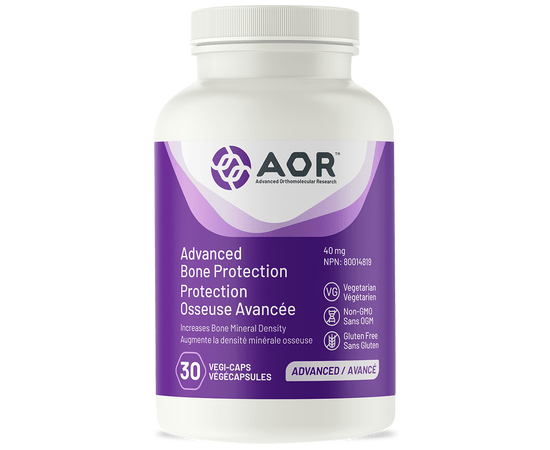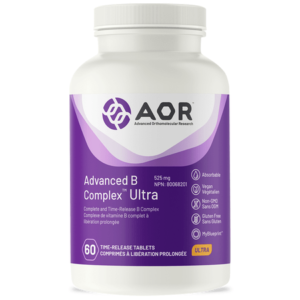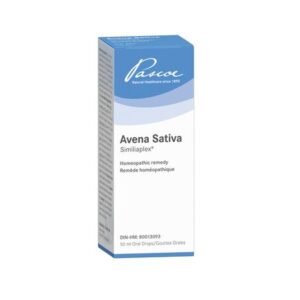Description
Details
Advanced Bone Protection is Milk Basic Protein (MBP™), a specific whey protein fraction found in trace amounts in bovine milk. MBP is considered to be so safe and vital that some food items are fortified with it in Japan, where it was discovered.
MBP has been shown to increase the activity of bone-building cells (osteoblasts) while reducing the activity of the cells that break down bone (osteoclasts), resulting in a more balanced and effective approach to preventing bone loss that leads to osteopenia and osteoporosis. It also helps bones to retain and use calcium more effectively, and to produce more collagen, an important part of the bone matrix.
Advanced Bone Protection is not a source of calcium, but rather a beneficial addition to any calcium-based bone health regimen for those at risk of developing or already suffering from, osteoporosis. It can also be used to support bone healing after sustaining a fracture. The daily therapeutic dose of Advanced Bone Protection fits into just one small capsule, which can be taken at any time of day, with or without food or other supplements.
AOR Advantage
The mechanism that makes AOR’s Advanced Bone Protection unique in its action is that it acts like Velcro, picking up calcium ions which “stick” to the bone, which is where they are needed. In doing so it also prevents the deposition of calcium in other tissues such as the arteries and kidneys.
Label Information NPN
80014819
Discussion
Advanced Bone Protection contains MBP™ (Milk Basic Protein), an active protein complex from the whey fraction of milk. Research demonstrates that MBP can positively impact bone health by reducing bone loss (resorption) and increasing bone mineral density.
Guarantees
AOR™ guarantees that all ingredients have been declared on the label. Contains no wheat, gluten, corn, nuts, peanuts, sesame seeds, sulphites, mustard, soy, eggs, fish, or shellfish.
Adult Dosage
(Studies show dose most effective for women)
Take one capsule daily with or without food or as directed by a qualified health care practitioner.
Cautions
Not recommended for people with milk allergies.
Main Applications
- Supports collagen production
- Promotes bone density
Disclaimer
The information and product descriptions appearing on this website are for information purposes only and are not intended to provide or replace medical advice to individuals from a qualified health care professional. Consult with your physician if you have any health concerns, and before initiating any new diet, exercise, supplement, or other lifestyle changes.
Supplement FactsServing Size: One Capsule
MBP™ (a specific basic protein fraction derived from bovine milk)
40 mg
†Source: bovine milk *MBP™ by Snow Brand Milk Products Co., Ltd.
Non-medicinal Ingredients: Microcrystalline cellulose, sodium stearyl fumarate.
Capsule: hypromellose.
Research Facts
Bone Health:
Study 1:
In this randomized, placebo-controlled clinical study, the effect of milk basic protein on bone mineral density (BMD) and bone density was evaluated in young women. 84 healthy women were randomly assigned to one of three groups – a control group, a whole milk group, or an MBP group, at 40 mg MBP per day for 8 months. The bone mineral density of the total body, the lumbar vertebrae L2-L4, and the left forearm of each subject were measured by dual-energy X-ray absorptiometry (DEXA) at 0 and 8 months of treatment. Serum indexes of bone metabolism were measured at zero, three, six, and eight months.
The results showed an increase in BMD in all groups, compared to the baseline, with both milk and MBP groups showing a larger increase in BMD. Bone metabolism was also decreased, with the larger differences observed in the milk and MBP groups, with no significant differences between the milk and MBP groups.
https://www.ncbi.nlm.nih.gov/pubmed/19296044
https://www.ncbi.nlm.nih.gov/pubmed/17048062
Study 2:
Two studies were carried out to evaluate the effect of MBP on bone loss, resorption, and bone metabolism in healthy adult women and men. In the study with healthy women, participants were randomized to receive a placebo or MBP at 40 mg per day for six months. The bone mineral density (BMD) of the left calcaneus of each subject was measured at the beginning of the study and after six months of treatment, by dual-energy x-ray absorptiometry. Serum and urine indices of bone metabolism were measured at the baseline, three-month intervals, and the end of the study. Daily intake of nutrients was monitored by a three-day food record made at three and six months. As with the previous study, a significant increase in BMD and a decrease in bone metabolism and bone loss was observed in the MBP group, compared to the placebo group. The authors conclude that the increase in BMD might be mediated primarily through the inhibition of osteoclast-mediated bone resorption by MBP.
In the adult male study, healthy participants were given 300 mg MBP per day for 16 days and assessed for markers of bone loss. The results show a significant decrease in bone metabolism and bone loss. A decrease in Urinary cross-linked N-telopeptides of type-I collagen (NTx) excretion was also observed, suggesting that MBP promoted the bone formation and suppressed bone resorption, while maintaining the balance of bone remodeling in healthy participants.
https://www.ncbi.nlm.nih.gov/pubmed/11471735
https://www.ncbi.nlm.nih.gov/pubmed/11388472
Study 3:
In a study in healthy menopausal women, the effect of MBP on bone metabolism was evaluated. Thirty-two participants were randomly assigned to receive MBP (40 mg per day) or placebo for 6 months and assessed for BMD of the lumbar vertebrae of each subject. Serum and urine indices of bone metabolism were also measured at zero, three, and six months.
The results show a significant mean rate gain of lumar BMD in the MBP group, compared to the placebo group. When compared with the placebo group, urinary cross-linked N-telopeptides of type-I collagen (NTx) were significantly decreased in the MBP group at 6 months. The authors conclude that MBP supplementation effectively prevented bone loss in menopausal women inhibited bone resorption while maintaining the balance of bone remodeling.
https://www.ncbi.nlm.nih.gov/pubmed/16133638




